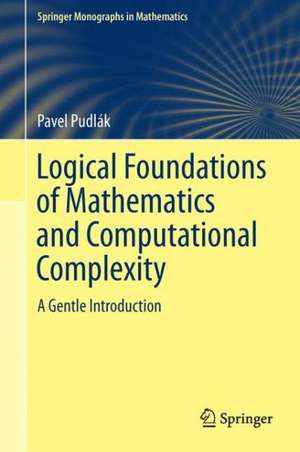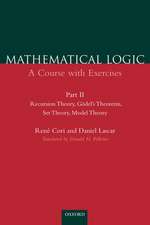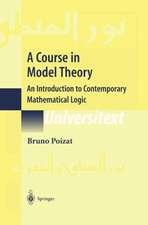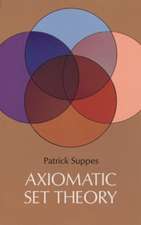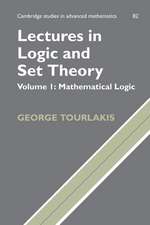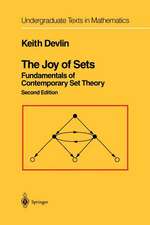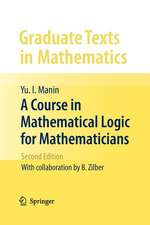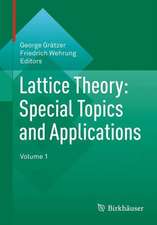Logical Foundations of Mathematics and Computational Complexity: A Gentle Introduction: Springer Monographs in Mathematics
Autor Pavel Pudláken Limba Engleză Hardback – 31 mai 2013
Emphasis is on explaining the essence of concepts and the ideas of proofs, rather than presenting precise formal statements and full proofs. Each section starts with concepts and results easily explained, and gradually proceeds to more difficult ones. The notes after each section present some formal definitions, theorems and proofs.
Logical Foundations of Mathematics and Computational Complexity is aimed at graduate students of all fields of mathematics who are interested in logic, complexity and foundations. It will also be of interest for both physicists and philosophers who are curious to learn the basics of logic and complexity theory.
| Toate formatele și edițiile | Preț | Express |
|---|---|---|
| Paperback (1) | 1127.46 lei 43-57 zile | |
| Springer International Publishing – 23 aug 2016 | 1127.46 lei 43-57 zile | |
| Hardback (1) | 1144.64 lei 43-57 zile | |
| Springer International Publishing – 31 mai 2013 | 1144.64 lei 43-57 zile |
Din seria Springer Monographs in Mathematics
- 18%
 Preț: 1234.77 lei
Preț: 1234.77 lei - 18%
 Preț: 753.23 lei
Preț: 753.23 lei - 20%
 Preț: 574.70 lei
Preț: 574.70 lei - 24%
 Preț: 740.03 lei
Preț: 740.03 lei - 24%
 Preț: 777.43 lei
Preț: 777.43 lei - 20%
 Preț: 818.29 lei
Preț: 818.29 lei - 18%
 Preț: 969.93 lei
Preț: 969.93 lei - 20%
 Preț: 758.03 lei
Preț: 758.03 lei - 9%
 Preț: 904.20 lei
Preț: 904.20 lei - 15%
 Preț: 607.33 lei
Preț: 607.33 lei - 8%
 Preț: 529.41 lei
Preț: 529.41 lei - 24%
 Preț: 1598.61 lei
Preț: 1598.61 lei -
 Preț: 396.40 lei
Preț: 396.40 lei - 18%
 Preț: 793.14 lei
Preț: 793.14 lei - 15%
 Preț: 650.86 lei
Preț: 650.86 lei - 18%
 Preț: 1236.19 lei
Preț: 1236.19 lei - 15%
 Preț: 499.77 lei
Preț: 499.77 lei -
 Preț: 391.61 lei
Preț: 391.61 lei - 18%
 Preț: 1404.30 lei
Preț: 1404.30 lei - 18%
 Preț: 797.24 lei
Preț: 797.24 lei - 18%
 Preț: 916.25 lei
Preț: 916.25 lei -
 Preț: 397.01 lei
Preț: 397.01 lei - 15%
 Preț: 657.25 lei
Preț: 657.25 lei - 15%
 Preț: 467.79 lei
Preț: 467.79 lei - 15%
 Preț: 648.05 lei
Preț: 648.05 lei -
 Preț: 406.25 lei
Preț: 406.25 lei -
 Preț: 389.88 lei
Preț: 389.88 lei - 15%
 Preț: 649.54 lei
Preț: 649.54 lei - 15%
 Preț: 581.14 lei
Preț: 581.14 lei - 15%
 Preț: 643.48 lei
Preț: 643.48 lei - 15%
 Preț: 647.73 lei
Preț: 647.73 lei - 18%
 Preț: 902.55 lei
Preț: 902.55 lei - 15%
 Preț: 653.33 lei
Preț: 653.33 lei - 18%
 Preț: 901.88 lei
Preț: 901.88 lei - 18%
 Preț: 907.27 lei
Preț: 907.27 lei - 18%
 Preț: 893.53 lei
Preț: 893.53 lei - 15%
 Preț: 659.53 lei
Preț: 659.53 lei - 18%
 Preț: 802.28 lei
Preț: 802.28 lei - 15%
 Preț: 661.32 lei
Preț: 661.32 lei - 15%
 Preț: 646.62 lei
Preț: 646.62 lei -
 Preț: 384.48 lei
Preț: 384.48 lei - 15%
 Preț: 704.36 lei
Preț: 704.36 lei - 18%
 Preț: 1248.20 lei
Preț: 1248.20 lei - 18%
 Preț: 1031.17 lei
Preț: 1031.17 lei -
 Preț: 409.13 lei
Preț: 409.13 lei - 18%
 Preț: 986.01 lei
Preț: 986.01 lei - 15%
 Preț: 640.37 lei
Preț: 640.37 lei - 15%
 Preț: 643.34 lei
Preț: 643.34 lei -
 Preț: 388.72 lei
Preț: 388.72 lei - 18%
 Preț: 965.34 lei
Preț: 965.34 lei
Preț: 1144.64 lei
Preț vechi: 1395.90 lei
-18% Nou
Puncte Express: 1717
Preț estimativ în valută:
219.10€ • 238.07$ • 184.16£
219.10€ • 238.07$ • 184.16£
Carte tipărită la comandă
Livrare economică 21 aprilie-05 mai
Preluare comenzi: 021 569.72.76
Specificații
ISBN-13: 9783319001180
ISBN-10: 3319001183
Pagini: 712
Ilustrații: XIV, 695 p. 49 illus., 4 illus. in color.
Dimensiuni: 155 x 235 x 43 mm
Greutate: 1.47 kg
Ediția:2013
Editura: Springer International Publishing
Colecția Springer
Seria Springer Monographs in Mathematics
Locul publicării:Cham, Switzerland
ISBN-10: 3319001183
Pagini: 712
Ilustrații: XIV, 695 p. 49 illus., 4 illus. in color.
Dimensiuni: 155 x 235 x 43 mm
Greutate: 1.47 kg
Ediția:2013
Editura: Springer International Publishing
Colecția Springer
Seria Springer Monographs in Mathematics
Locul publicării:Cham, Switzerland
Public țintă
ResearchCuprins
Mathematician’s world.- Language, logic and computations.- Set theory.- Proofs of impossibility.- The complexity of computations.- Proof complexity.- Consistency, Truth and Existence.- References.
Recenzii
“This monograph by the outstanding Czech logicianPavel Pudlák provides a broad but also deep survey of work in logic andcomputer science relevant to foundational issues, interpreted in a wide sense.… This is a fine overview of logic and complexity theory that can beconfidently recommended to anybody who would like to orient themselves in anincreasingly intricate and difficult field.” (Alasdair Urquhart, PhilosophiaMathematica, Vol. 23 (3), October, 2015)
“For the non-expert it offers indeed a ‘gentle introduction’ to logic that is well selected and excellently explained. And for the logician it certainly offers some of the best introductions to those topics outside their area of direct expertise. … it contains plenty of informal explanations, intuition and motivation. … It is truly a gift to the logic and wider communities … . This book is very enjoyable to read and I wish it all success.” (Olaf Beyersdorff, Mathematical Reviews, August, 2014)
“It spans the historical, logical, and at times philosophical underpinnings of the theory of computational complexity. Students of mathematics seeking a transition to higher mathematics will find it helpful, as will mathematicians with expertise in other areas. … an excellent choice for a first text in studying complexity, or as a clarifying adjunct to any assigned text in this area. … a compact guide for graduate students with a need for or interest in computational complexity and its foundations.” (Tom Schulte, MAA Reviews, July, 2014)
“This book, exactly as indicated by its title, deals with the main philosophical, historical, logical and mathematical aspects … in a quite approachable and attractive way. … the prospective readers of this book are mathematicians with an interest in the foundations, philosophers with a good background in mathematics, and also philosophically minded scientists. Due to the author’s nice style, the book will be a very good choice for the first text in studying this subject.” (Branislav Boričić, zbMATH, Vol. 1270, 2013)
“For the non-expert it offers indeed a ‘gentle introduction’ to logic that is well selected and excellently explained. And for the logician it certainly offers some of the best introductions to those topics outside their area of direct expertise. … it contains plenty of informal explanations, intuition and motivation. … It is truly a gift to the logic and wider communities … . This book is very enjoyable to read and I wish it all success.” (Olaf Beyersdorff, Mathematical Reviews, August, 2014)
“It spans the historical, logical, and at times philosophical underpinnings of the theory of computational complexity. Students of mathematics seeking a transition to higher mathematics will find it helpful, as will mathematicians with expertise in other areas. … an excellent choice for a first text in studying complexity, or as a clarifying adjunct to any assigned text in this area. … a compact guide for graduate students with a need for or interest in computational complexity and its foundations.” (Tom Schulte, MAA Reviews, July, 2014)
“This book, exactly as indicated by its title, deals with the main philosophical, historical, logical and mathematical aspects … in a quite approachable and attractive way. … the prospective readers of this book are mathematicians with an interest in the foundations, philosophers with a good background in mathematics, and also philosophically minded scientists. Due to the author’s nice style, the book will be a very good choice for the first text in studying this subject.” (Branislav Boričić, zbMATH, Vol. 1270, 2013)
Textul de pe ultima copertă
The two main themes of this book, logic and complexity, are both essential for understanding the main problems about the foundations of mathematics. Logical Foundations of Mathematics and Computational Complexity covers a broad spectrum of results in logic and set theory that are relevant to the foundations, as well as the results in computational complexity and the interdisciplinary area of proof complexity. The author presents his ideas on how these areas are connected, what are the most fundamental problems and how they should be approached. In particular, he argues that complexity is as important for foundations as are the more traditional concepts of computability and provability.
Emphasis is on explaining the essence of concepts and the ideas of proofs, rather than presenting precise formal statements and full proofs. Each section starts with concepts and results easily explained, and gradually proceeds to more difficult ones. The notes after each section present some formal definitions, theorems and proofs.
Logical Foundations of Mathematics and Computational Complexity is aimed at graduate students of all fields of mathematics who are interested in logic, complexity and foundations. It will also be of interest for both physicists and philosophers who are curious to learn the basics of logic and complexity theory.
Emphasis is on explaining the essence of concepts and the ideas of proofs, rather than presenting precise formal statements and full proofs. Each section starts with concepts and results easily explained, and gradually proceeds to more difficult ones. The notes after each section present some formal definitions, theorems and proofs.
Logical Foundations of Mathematics and Computational Complexity is aimed at graduate students of all fields of mathematics who are interested in logic, complexity and foundations. It will also be of interest for both physicists and philosophers who are curious to learn the basics of logic and complexity theory.
Caracteristici
Presents a wide range of results in logic and computational complexity Explains the topic informally and then in more detail for the advanced reader Presents the ideas behind the theoretical concepts Includes supplementary material: sn.pub/extras
